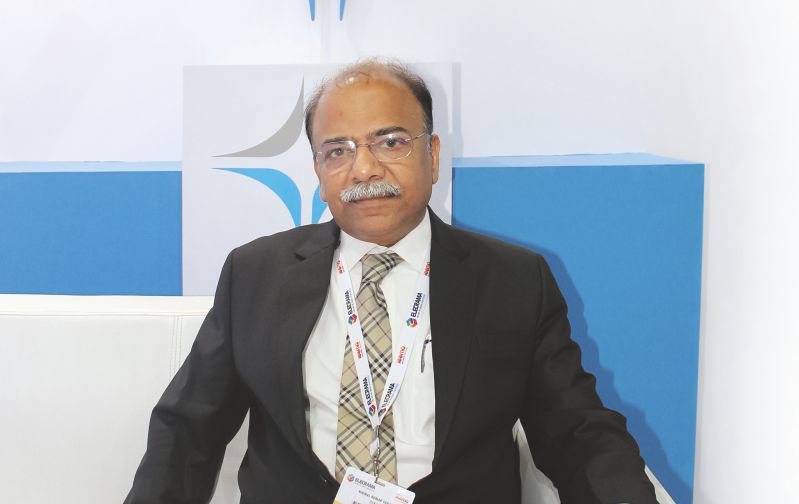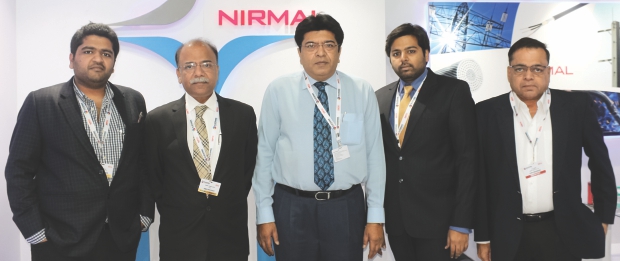Nirmal Group’s manufacturing activities span close to 5 decades making it an acknowledged producer of GI wires, conductors, hot rolled products and construction steel. The Group has been a constant votary of ‘quantity with quality’ and its annual turnover achieved a 200 percent growth in 2014 with the installation of one of the world’s most advanced facilities for GI wires. The Group is contemplating the capacity expansion by at least 75 percent in near-term.

Managing Director, Nirmal Group
“The problem is because you choose an economical level of capacity by looking only at the Indian market even if the domestic market is not there. The capacities should be planned in a manner that the product matches the international standard produced at very competitive cost and is able to compete anywhere, domestically or globally. If your quality is good and the cost is competitive, you can sell abroad in case you don’t find a market in India,” said Mr. Nirmal Saraf, Managing Director, Nirmal Group of Companies on how to plan a capacity in India.
Wire & Cable India: We would like to take your views on the Indian steel wire industry.
Nirmal Saraf: The Indian steel wire industry at this time is going through a phase where there is a need to upgrade quality in order to control the operating cost. Besides, we need to expand the industry to a global level so that we can compete in the international markets.
WCI: How do you think the Indian steel wire industry is positioned to cater to quality demands and compete in the global marketplace?
NS: We are very well placed to make steel at a low cost. I have been seeing of late, the quality of steel manufactured by the steel producer in India is continuously improving. If the quality of steel improves continuously to match the international standard where steel plants are able to provide excellent quality with very reasonable or globally competitive prices to the engineering industries like us, then it is in the interest of Indian steel industry as a whole. The steel industry should put up capacities which have got economies of scale.
Apart from satisfying the local demands, we should be able to export competitively to the entire world. We should be able to compete in terms of service, quality, and cost. Also, we need to keep the cost low, and try to minimize cost wherever we can and be cost and quality competitive to gain a foothold in the world. By adding capacities I mean being globally economical and big enough to have an edge over other players in the global market. And, depending just on the Indian market is not the way to grow very fast.
WCI: Tell us about the new developments or expansion plans at Nirmal Wires.
NS: Nirmal Wires has just stabilized the recent expansion. The demand from customers for our product is high and has reached to a stage where we have to turn down few supply requests from the customers. We are thinking very strongly about expanding the current capacity by at least 75 percent.
WCI: Are there any plans for backward integration?
NS: No, not at this time because whenever you talk about backward integration, the domain knowledge, the expertise, and the capital investment is required there. The minimum economic size of a backward integration is not within our line of actions as of now. We would like to wait and obviously when the time comes, we would certainly look for backward integration. But, there are no such plans in the near future.
WCI: Tell us about the improved product range.
NS: The expansion is the horizontal expansion. Therefore, we will be expanding the quantities in the existing product range which is basically black wires, mild steels, high carbon, patented wires, prestressed concrete wires, galvanized wires, galvanized wires strands (7 and 19 strands), and barbed wires. This is the present range. We would like to expand along with some special grades like C-class coating in galvanizing and some further value-added products which are much more quality sensitive. That is basically what we will be doing.
WCI: As you said, quality in the longer run is going to define the Indian steel and steel wire industry. But in a country like India, how would you ensure that quality improves continuously?
NS: For instilling quality practices in manufacturing process, the first thing is to make people believe that they can do it. It is to make them believe that quantity without quality is not acceptable. You have to be very strong on the shop floor and direct your people strictly regarding the quality parameters. The message should be loud and clear that if you cannot make quality products then don’t make anything at all. Maybe the management of few companies do not focus on quality, but they are realizing that bad quality restricts sales quantity in the long-term.
At the outset, you need to train your workforce mentally to be quality conscious, and then you have to start implementing quality right from the procurement process to all your stores and everywhere. You must work proactively to cultivating a quality culture starting from your organization to spaces beyond it – right from your shop floor to your vendors.
WCI: Often in India, capacity addition becomes painful when the producer doesn’t find enough demand commensurate with the added capacity. Your views on this!
NS: The problem is because you choose an economical level of capacity by looking only at the Indian market even if the domestic market is not there. The capacities should be planned in a manner that the product matches the international standard produced at very competitive cost and is able to compete anywhere, domestically or globally. If your quality is good and the cost is competitive, you can sell abroad in case you don’t find a market in India. And as a company policy, at least 30-35 percent of total production should be earmarked for export. If the Indian market grows, there will be an opportunity to grow further.
WCI: Any other message you would like to give.
NS: Today, everyone talks about being ground beaten and outclassed by China. But I am convinced that in today’s scenario, China will not be able to compete with India if we follow the basic principles of excellent product quality and exemplary service aimed at delighting the customer by going beyond the customer’s expectations. We need to raise the expectations of our customers with respect to quality and service, to a level which competitors will find next to impossible to reach.





